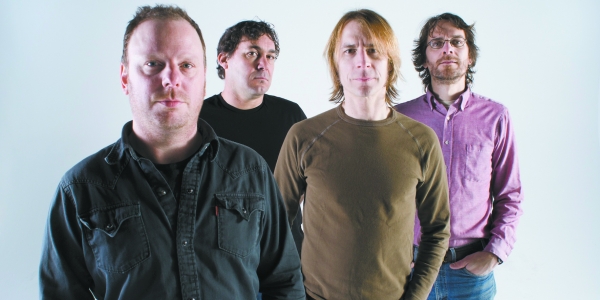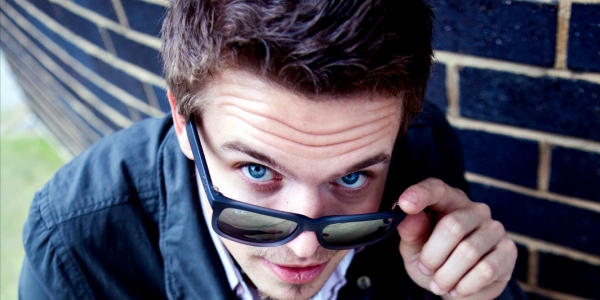“I’d dropped out of college, and I promised my parents I’d take a couple of years off, and then go back,” Turner says. “But I never did – I’m the first member of my family not to make it through college. I suppose I regret not going back – I suppose these are the things I’m going to have to go through with my own kids,” he laughs.
The genesis of Mudhoney lies in two particular bands: Mr Epp And The Calculations, the band formed originally by Mark Arm in the early ’80s, and Green River, the outfit featuring members of Mudhoney and Green River which preceded immediately the formation of Mudhoney. “I first met Mark when we were waiting in line to get into see TSOL in about October 1982,” Turner recalls. “I already knew who he was – I knew he was in Mr Epp, and they already had a single out.” Turner had an inkling that he and Arm would share a number of subcultural musical interests; it didn’t take long before the two were introduced and a musical partnership was born. “A mutual friend introduced us – he said, ‘Mark, this is Steve – he’s straight edge too!” Turner laughs. “And we got along really great.”
Turner eventually joined Turner in Mr Epp, before forming Green River in 1984, alongside future Pearl Jam members Stone Gossard and Jeff Ament. By 1988 Green River had largely disintegrated, and Turner and Arm were looking to the future. Turner and Arm sat down and “itemised” the bands that they’d like their next project to draw inspiration from. “We wrote out the bands that we really liked, like The Stooges, dirty punk rock like The Pagans, Dead Boys, Black Flag, Feedtime, Scientists and The Birthday Party – they were our major touchstones,” Turner says.
Another key attribute in the Mudhoney mix was Arm’s role as a guitarist. In Green River Arm was the classic unencumbered front man, bounding about the stage with wild abandon. For Mudhoney, Turner wanted everyone, including the lead singer, to be contributing musically to the mix. “I had to make sure I had Mark playing guitar,” Turner says. “He had no real skill, but he made great noise. I didn’t want him jumping around the stage like he was in Green River.”
It’s been claimed in other interviews that Arm and Turner saw Mudhoney as a short-term project, consistent with the traditional punk rock narrative. “I don’t think I really expected anything when we first started,” Turner says. “Dan [Peters] was already playing in bands at the time, and I just wanted to put out a couple of singles – I suppose I saw it more as a project than a band. But everything came together really well.”
While both Turner and Arm had their musical roots in the hardcore scene, Mudhoney was considered more of a punk band. “We definitely considered ourselves a punk band – we didn’t feel much affinity with the hardcore bands, even though that’s where we came from,” Turner says. By the early ’90s punk had been appropriated and re-branded by the mainstream music industry and media as ‘grunge’. For Turner, what became known as grunge, had always been punk. “I thought of bands like Killdozer and Dinosaur Jr as punk bands. The scene was what it was – you could argue that the punk scene around 1986-1988 was the grunge scene,” Turner says.
Having made its mark with the early singles Touch Me I’m Sick, the cover of The Dicks’ Hate The Police and the Superfuzz Bigmuff EP released on the Seattle label SubPop, Mudhoney eventually signed a deal with Reprise Records, where the band would stay until the late ’90s. Turner says the experience of working with a major label wasn’t as bad as many in the punk rock world might expect. “I don’t know if we didn’t learn anything that we didn’t already know,” he says. “We got a good deal, and they really left us alone. But by the time we left, I think we’d been there a bit too long – we stayed so that we could use the recording budget they gave us.” Mudhoney subsequently returned to its SubPop origins, after the label arrested its potential terminal decline after a series of financial calamities. “I don’t see us leaving SubPop, unless it stops completely,” Turner says. “The whole industry has changed so much, and we’d never be on a major label again.”
As for Mudhoney’s infamous show at The Tote when they were cajoled onto the stage for a set of covers, only to be confronted by a typically excited Ian Rilen participating in a chook raffle, Turner’s memories are hazy at best. “We were all so fucked up at that show,” he laughs. “I’m not even sure what a chook raffle is! But we knew who Ian Rilen was, because we’d heard X-Aspirations. It was great to meet him, and to hang out with him,” Turner says.
Rilen’s dedication to the rock ‘n’ roll cause presumably has had some subconscious effect on the members of Mudhoney: to see Mudhoney these days is to witness a bunch of grown-up kids still enjoying punk rock with the same youthful enthusiasm of yore. The title of Mudhoney’s last record, The Lucky Ones, suggests the band is acutely aware of its fortunate position in punk rock history. “We’re still here, and we get to do what we want to do,” Turner says. “And with our last record, we got to make a good record, which was lucky!”
And what of the nihilistic attitude conveyed in the lyric “No-one gives a shit what I do, so I’ll do it anyway” from the opening track of Turner’s solo record from a few years ago? “That’s kind of a freeing thought,” Turner explains. “It’s a happy thought, not a nihilistic thing. I’m happy doing what I’m doing. I like going to see shitty little bands!” Turner laughs.
BY PATRICK EMERY







